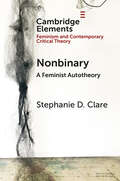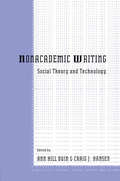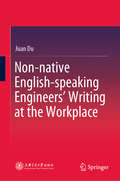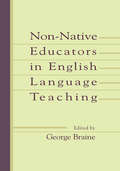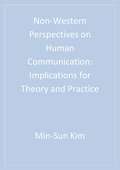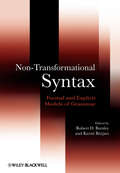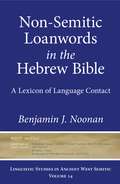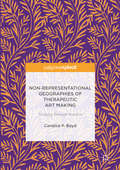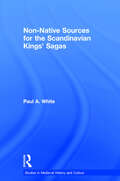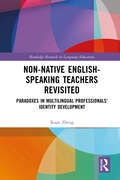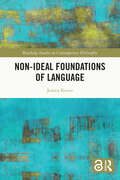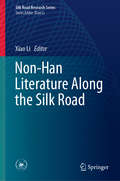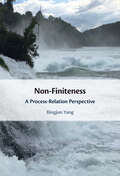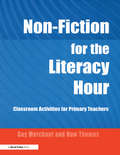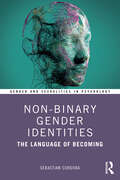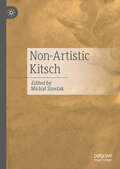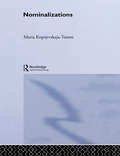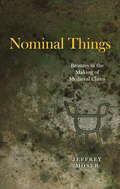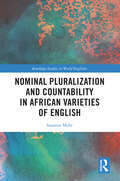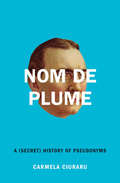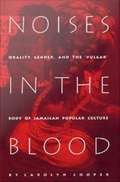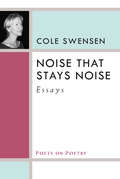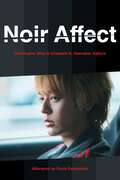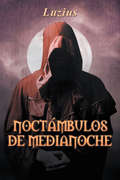- Table View
- List View
Nonbinary: A Feminist Autotheory (Elements in Feminism and Contemporary Critical Theory)
by Stephanie D. ClareThis autotheoretical Element, written in the tense space between feminist and trans theory, argues that movement between 'woman' and 'nonbinary' is possible, affectively and politically. In fact, a nonbinary structure of feeling has been central in the history of feminist thought, such as in Simone de Beauvoir's The Second Sex (1949). This structure of feeling is not antifeminist but indexical of a desire for a form of embodiment and relationality beyond binary sex and gender. Finally, the Element provides a partial defense of nonbinary gender identity by tracing the development of the term in online spaces of the early 2000s. While it might be tempting to read its development as symptomatic of the forms of selfhood reproduced in (neo)liberal, racialized platform capitalism, this reading is too simplistic because it misses how the term emerged within communities of care.
Nonacademic Writing: Social Theory and Technology
by Ann Hill DuinIn this volume, methodological, cultural, technological, and political boundaries felt by writers are analyzed, translated, and challenged in a way that will appeal to researchers, theorists, graduate students, instructors, and managerial audiences. Instead of extracting rules from previous research, the contributors, working from multidisciplinary perspectives, describe and analyze the social and technological contexts surrounding nonacademic writing. Their essays present a formative rather than summative outlook toward future research on nonacademic writing. Collectively, these chapters articulate a unique perspective toward nonacademic writing that considers: * The centrality of emerging communications technologies in nonacademic writing research and the need for a socio-technological perspective. New technologies reshape the concept of text and significantly impact the writing process and written products in nonacademic settings. * The relationship between the academy and the workplace. A number of chapters challenge us -- sometimes from opposing perspectives -- to scrutinize our role as writing educators in preparing students for the workplace. Should we support the interests of corporate employers, or should we resist those interests? Should we enculturate students in workplace writing practices by placing them in these environments, or should we examine the tacit knowledge gained by workplace professionals and deliver this via classroom instruction? * New theory, new research agendas. Contributors from diverse fields offer new theoretical lenses or use established lenses in innovative ways, expanding the agenda for nonacademic writing research. This volume represents the vision the social landscape demands for research and pedagogy in nonacademic writing.
Non-native English-speaking Engineers’ Writing at the Workplace
by Juan DuBased on 55 semi-structured in-depth interviews, this book investigates 15 high-tech engineering co-op professionals’ writing experience in the workplace. It shows how the digital age has had a marked impact on the engineers’ methods of communication at work, and how on-the -job writing has affected engineers’ technical competence, shaped their professional identities, challenged their views on Chinese and English writing, and hindered their success in the workplace. The book identifies three aspects of writing practice: engineers’ linguistic and literacy challenges, the reasons behind these challenges, and coping strategies, which suggest that engineers are underprepared and lack necessary support in the workplace. Lastly, the study shows that engineers need to engage in technical literacy through on-the-job writing so that they can fully deal with workplace discourse and socialize with diverse professional groups.Since the sample group interviewed in this book is engineers who studied at universities in the United States and have a foot in the world of school and work as well as knowledge of both Eastern and Western cultures, the book appeals to teachers, students, engineers and scientists who are interested in scientific and technological writing. It is also valuable for educators who prepare scientists, engineers, and technical communicators for professional roles, as well as for communication practitioners who work with engineers.
Non-native Educators in English Language Teaching
by George BraineThe place of native and non-native speakers in the role of English teachers has probably been an issue ever since English was taught internationally. Although ESL and EFL literature is awash, in fact dependent upon, the scrutiny of non-native learners, interest in non-native academics and teachers is fairly new. Until recently, the voices of non-native speakers articulating their own concerns have been even rarer. This book is a response to this notable vacuum in the ELT literature, providing a forum for language educators from diverse geographical origins and language backgrounds. In addition to presenting autobiographical narratives, these authors argue sociopolitical issues and discuss implications for teacher education, all relating to the theme of non-native educators in ETL. All of the authors are non-native speakers of English. Some are long established professionals, whereas others are more recent initiates to the field. All but one received part of the higher education in North America, and all except two of the chapters are at least partially contextualized in North America. Particularly relevant for non-native speakers who aspire to enter the profession, graduate students in TESOL programs, and teacher educators, the unique nature of this book's contributors and its contents will interest researchers and professionals in applied linguistics generally and in ELT, and all those who are concerned with the role of non-native speakers in English-language teaching.
Non-Western Perspectives on Human Communication: Implications for Theory and Practice
by Dr Min-Sun KimWhat it means to be a self - and a self communicating and being in a particular culture - are key issues interwoven throughout Min-Sun Kim's impressive text, Non-Western Perspectives on Human Communication. Going beyond cultural descriptions or instructions on adapting to specific cultures, the author interrogates the very core assumptions underlying the study of human communication and challenges longstanding individualistic, Western models on which much intercultural research is based. Kim proposes a non-western way of conceptualizing identity, or the "self" - the cornerstone of cultural research -- illuminating how traditional western and non-western views can be blended into a broader, more realistic understanding of cultures and communication. Grounding her work in a thorough knowledge of the literature, she challenges students and researchers alike to reexamine their approach to intercultural study.
Non-Transformational Syntax: Formal and Explicit Models of Grammar
by Kersti Börjars Robert D. BorsleyThis authoritative introduction explores the four main non-transformational syntactic frameworks: Head-driven Phrase Structure Grammar, Lexical-Functional Grammar, Categorial Grammar, and Simpler Syntax. It also considers a range of issues that arise in connection with these approaches, including questions about processing and acquisition. An authoritative introduction to the main alternatives to transformational grammar Includes introductions to three long-established non-transformational syntactic frameworks: Head-driven Phrase Structure Grammar, Lexical-Functional Grammar, and Categorial Grammar, along with the recently developed Simpler Syntax Brings together linguists who have developed and shaped these theories to illustrate the central properties of these frameworks and how they handle some of the main phenomena of syntax Discusses a range of issues that arise in connection with non-transformational approaches, including processing and acquisition
Non-Semitic Loanwords in the Hebrew Bible: A Lexicon of Language Contact (Linguistic Studies in Ancient West Semitic)
by Benjamin J. NoonanAncient Palestine served as a land bridge between the continents of Asia, Africa, and Europe, and as a result, the ancient Israelites frequently interacted with speakers of non-Semitic languages, including Egyptian, Greek, Hittite and Luwian, Hurrian, Old Indic, and Old Iranian. This linguistic contact led the ancient Israelites to adopt non-Semitic words, many of which appear in the Hebrew Bible. Benjamin J. Noonan explores this process in Non-Semitic Loanwords in the Hebrew Bible, which presents a comprehensive, up-to-date, and linguistically informed analysis of the Hebrew Bible’s non-Semitic terminology.In this volume, Noonan identifies all the Hebrew Bible’s foreign loanwords and presents them in the form of an annotated lexicon. An appendix to the book analyzes words commonly proposed to be non-Semitic that are, in fact, Semitic, along with the reason for considering them as such. Noonan’s study enriches our understanding of the lexical semantics of the Hebrew Bible’s non-Semitic terminology, which leads to better translation and exegesis of the biblical text. It also enhances our linguistic understanding of the ancient world, in that the linguistic features it discusses provide significant insight into the phonology, orthography, and morphology of the languages of the ancient Near East. Finally, by tying together linguistic evidence with textual and archaeological data, this work extends our picture of ancient Israel’s interactions with non-Semitic peoples.A valuable resource for biblical scholars, historians, archaeologists, and others interested in linguistic and cultural contact between the ancient Israelites and non-Semitic peoples, this book provides significant insight into foreign contact in ancient Israel.
Non-Semitic Loanwords in the Hebrew Bible: A Lexicon of Language Contact (Linguistic Studies in Ancient West Semitic #14)
by Benjamin J. NoonanAncient Palestine served as a land bridge between the continents of Asia, Africa, and Europe, and as a result, the ancient Israelites frequently interacted with speakers of non-Semitic languages, including Egyptian, Greek, Hittite and Luwian, Hurrian, Old Indic, and Old Iranian. This linguistic contact led the ancient Israelites to adopt non-Semitic words, many of which appear in the Hebrew Bible. Benjamin J. Noonan explores this process in Non-Semitic Loanwords in the Hebrew Bible, which presents a comprehensive, up-to-date, and linguistically informed analysis of the Hebrew Bible’s non-Semitic terminology.In this volume, Noonan identifies all the Hebrew Bible’s foreign loanwords and presents them in the form of an annotated lexicon. An appendix to the book analyzes words commonly proposed to be non-Semitic that are, in fact, Semitic, along with the reason for considering them as such. Noonan’s study enriches our understanding of the lexical semantics of the Hebrew Bible’s non-Semitic terminology, which leads to better translation and exegesis of the biblical text. It also enhances our linguistic understanding of the ancient world, in that the linguistic features it discusses provide significant insight into the phonology, orthography, and morphology of the languages of the ancient Near East. Finally, by tying together linguistic evidence with textual and archaeological data, this work extends our picture of ancient Israel’s interactions with non-Semitic peoples.A valuable resource for biblical scholars, historians, archaeologists, and others interested in linguistic and cultural contact between the ancient Israelites and non-Semitic peoples, this book provides significant insight into foreign contact in ancient Israel.
Non-Representational Geographies of Therapeutic Art Making
by Candice P. BoydUtilising non-representational theories and practice-led research methods, this book serves to reclaim therapeutics as ecological, spatial and material. It examines the sites and performances of a wide range of therapeutic art practices, including painting and drawing, dance movement therapy, fibre art, subterranean graffiti practice, and poetic permaculture. In doing so it provides an important assessment of the role and status of therapy in contemporary life. A highly interdisciplinary text, Boyd’s research is informed by a thorough reading of post-structural theory including contemporary feminism, Guattari’s ethico-aesthetic paradigm, Whitehead’s process-oriented ontology, and Deleuze’s writing on sense and the event. This innovative study will prove essential for scholars and practitioners of cultural geography, socially-engaged art, therapeutic studies, and occupational therapy.
Non-Native Sources for the Scandinavian Kings' Sagas (Studies In Medieval History And Culture Ser. #34)
by Paul A. WhiteTraditional scholarship on the kings' sagas has tended to focus on the textual histories and interrelationships between the various twelfth- and thirteenth-century Scandinavian manuscripts. Thus previous scholars have striven to ascertain chronology, dating, and potential literary borrowings between the various native medieval manuscripts without considering the possibility of foreign textual influences on native literary traditions. Non-Native Sources for the Scandinavian Kings' Sagas prompts scholars to look beyond the borders of medieval Scandinavia in the attempt to account for seemingly inexplicable literary motifs and historical accounts.
Non-Native English-Speaking Teachers Revisited: Paradoxes in Multilingual Professionals' Identity Development (Routledge Research in Language Education)
by Xuan ZhengDrawing on ethnographical evidence, this book examines the complexity of the controversial construct “Non-Native English-Speaking Teacher” (NNEST) and the newly proposed “translingual/translanguaging teacher” in re-scripting their identities.Zheng examines the process of international graduate students’ learning to become composition teachers and English professionals in the United States. The book addresses the danger of either constructing fixed boundaries or dissolving them and helps readers to understand the duality of fixity and fluidity in identity development. Zheng advocates for open dialogue between different ideologies in approaching language diversity in schools with the same aim of social justice.This volume will attract academic readers from a range of disciplines and in different contexts: trainers of international teaching assistants, composition/second language writing scholars, and present or future professionals in TESOL/second/foreign language teaching.
Non-Ideal Foundations of Language (Routledge Studies in Contemporary Philosophy)
by Jessica KeiserThis book argues that the major traditions in the philosophy of language have mistakenly focused on highly idealized linguistic contexts. Instead, it presents a non-ideal foundational theory of language that contends that the essential function of language is to direct attention for the purpose of achieving diverse social and political goals. Philosophers of language have focused primarily on highly idealized linguistic contexts in which cooperative agents are working toward the shared goal of gaining information about the world. This approach abstracts away from important issues like power, ideology, social position, and diversity of goals which are crucial to explaining linguistic phenomena both at the semantic and pragmatic levels. This book begins by examining the work of some of the pioneers of this tradition—primarily David Lewis, Paul Grice, and Robert Stalnaker. The author shows that various problems have their source in idealizations made at the foundational level of linguistic theory and proposes to rebuild from the ground-up. She presents a non-ideal foundational theory of language which retains the major insights of traditional frameworks while rejecting the social idealizations that guide them. Then, she explores the social and political applications of her account to issues such as dog whistling, propaganda, racist speech, silencing, and manipulation. Non-Ideal Foundations of Language will appeal to researchers and advanced students in philosophy of language who are interested in the social and political applications of language, as well as traditional metasemantic theory.
Non-Han Literature Along the Silk Road (Silk Road Research Series)
by Xiao LiThis volume includes outstanding scientific articles on documents written in ancient languages such as Tocharian, Sogdian, Khotanese, and Old Uyghur. Its chief aims are to contribute to the present state of research by adding essential findings on newly discovered historical documents; to present a multi-dimensional investigation of diverse aspects including the history, religion, art, literature, and social life along the Silk Road; and to outline potential future research directions for non-Han literature studies and inspire research into other aspects, such as economics and comparative studies.
Non-Finiteness: A Process-Relation Perspective
by Bingjun Yang'Non-finiteness' is a phenomenon that occurs in most natural languages, whereby a verb is not inflected by grammatical tense, and does not possess the grammatical features of aspect, mood or voice. Various theories have been developed to explain their distribution and their role in clause structure, but many instances of non-finiteness remain unaccounted for. Taking a functional approach, this study proposes a 'process relation framework' to explain the more complex, previously unaccounted for, instances of non-finiteness in clause structure. It applies the framework comparatively to non-finiteness in English and Chinese, showing how it can be applied across typologically distinct languages. Drawing on corpus-based instances and observations, it introduces numerous thought-provoking cases, in which constructional (or combining) types and the predictability of non-finiteness co-occur. In terms of application, non-finiteness is decisive in categorising language types, and it is critical in processing natural languages, text segmentation and annotation in particular.
Non-Fiction for the Literacy Hour: Classroom Activities for Primary Teachers
by Huw Thomas Guy MerchantThis book offers practical guidance for teachers using the National Literacy Strategy at Key Stages 1 and 2, based on the six categories of non-fiction outlined in the Strategy. It gives an accessible introduction to the features of each of these text types. Many teachers now feel confident in working with fiction and poetry, whereas the non-fiction objectives have been more challenging. The book includes new subject knowledge, such as understanding the linguistic features of different text types, and the need to find authentic reading material; practical classroom examples; high-quality photocopiable texts and activity sheets; and detailed guidance on how to work with the material at text, sentence and word level. Each chapter consists of a description of the genre, a text example, a photocopiable double-page spread giving an annotated version of the text, details of the classroom resources for developing the ideas and activity sheets for each text. The book will appeal to all teachers and student teachers working at Key Stages 1 and 2, English and Literacy advisers in LEAs, and providers of initial and in-service training.
Non-Binary Gender Identities: The Language of Becoming (Gender and Sexualities in Psychology)
by Sebastian CordobaNon-Binary Gender Identities examines how non-binary people discover, adopt, and negotiate language in a variety of social settings, both offline and online. It considers how language, in the form of gender-neutral pronouns, names, and labels, is a central aspect of identity for many and has been the subject of much debate in recent years. Cordoba captures the psychological, social, and linguistic experiences of non-binary people by illustrating the multiple, complex, and evolving ways in which non-binary people use language to express their gender identities, bodies, authenticity, and navigate social interactions – especially those where their identities are not affirmed. These findings shed light on the gender and linguistic becomings of non-binary people, a pioneering theoretical framework developed in the book, which reflects the dynamic realities of language, subjectivities, and the materiality of the body. Informed by these findings, the text offers recommendations for policy makers and practitioners, designed to facilitate gender-related communication and decrease language-related distress on non-binary people, as well as the general population. This important book advances our understanding of non-binary gender identities by employing innovative methodologies – including corpus-based research and network visualisation – furthering and developing theory, and yielding original insights. It is essential reading for students and academics in social psychology and gender studies, as well as anyone interested in furthering their understanding of non-binary gender identities.
Non-Artistic Kitsch
by Michał SzostakThe book aims to provide a contemporary individual with an extensive but focused set of examples of kitsch in non-artistic spheres to create theoretical and practical backgrounds for conscious recognition of kitsch in fields like psychology, education, politics, law, religion, terrorism, television, or journalism. Two perspectives are underlined: 1) the consciousness of the presence and role of kitsch experience within the philosophy of living and 2) the management of kitsch experience within the philosophy of living (kitsch as a means for achieving goals). Due to the diverse topics covered by particular chapters, no unified methodology is applied in the whole volume. However, due to the kitsch’s complex and metaphysical character, the only fundament is using the “kitsch experience theory” (Szostak and Sułkowski, 2020) to narrate the volume coherently. The authors apply a qualitative methodological approach, extensively using case studies, comparative analyses, and ethnographic focus.
Nominalizations
by Maria Koptjevskaja-TammBased on extensive and diverse material from 70 languages, and covering a range of previously undiscussed problems, this book provides a thorough analysis of how nominalization types interact with other structural features. It focuses on action nominal constructions, and in particular, the comparison of their syntactic structure with that of finite clauses and of other noun phrases, a problem which has claimed much attention in current syntactic theories. Supported by rich empirical material and clearly illustrated with examples from all the sample languages, the book provides a detailed and consistent basis for constructing a typology of derived constructions and for presenting cross-linguistic comparisons.
Nominal Things: Bronzes in the Making of Medieval China
by Jeffrey MoserHow the medieval study of ancient bronzes influenced the production of knowledge and the making of things in East Asia. This book opens in eleventh-century China, where scholars were the first in world history to systematically illustrate and document ancient artifacts. As Jeffrey Moser argues, the visual, technical, and conceptual mechanisms they developed to record these objects laid the foundations for methods of visualizing knowledge that scholars throughout early modern East Asia would use to make sense of the world around them. Of the artifacts these scholars studied, the most celebrated were bronze ritual vessels that had been cast nearly two thousand years earlier. While working to make sense of the relationship between the bronzes’ complex shapes and their inscribed glyphs, they came to realize that the objects were “nominal things”—objects inscribed with names that identified their own categories and uses. Eleventh-century scholars knew the meaning of these glyphs from hallowed Confucian writings that had been passed down through centuries, but they found shocking disconnects between the names and the bronzes on which they were inscribed. Nominal Things traces the process by which a distinctive system of empiricism was nurtured by discrepancies between the complex materiality of the bronzes and their inscriptions. By revealing the connections between the new empiricism and older ways of knowing, the book explains how scholars refashioned the words of the Confucian classics into material reality.
Nominal Pluralization and Countability in African Varieties of English (Routledge Studies in World Englishes)
by Susanne MohrThis book is the first comprehensive analysis of nominal plural marking, its morphosyntax and semantics, across different African varieties of English. Mohr explores the rich diversity in the varieties and how different conceptualizations of the number category are realized across different cultures. The investigation of unstandardized noun plurals in Kenyan, Tanzanian, Ghanaian and Nigerian Englishes is based on a mixed methods design drawing on corpus linguistics, acceptability questionnaires and psycholinguistic experiments. In this vein, the book not only contributes to the description of each of these four varieties, but also sheds light on standardization processes and language change in New Englishes. Importantly, it is a plea for the triangulation of data and mixed methods approaches in World Englishes research, as the combination of these methods grants insight into unforeseen areas of language structures and use. This volume is a useful reference work for students and researchers in World Englishes, varieties of English and African Studies, as well as those interested in linguistic anthropology.
Nom de Plume: A (Secret) History of Pseudonyms
by Carmela CiuraruA literary history of eighteen authors from the 19th and 20th centuries and their famous pseudonyms.Exploring the fascinating stories of more than a dozen authorial impostors across several centuries and cultures, Carmela Ciuraru plumbs the creative process and the darker, often crippling aspects of fame.Only through the protective guise of Lewis Carroll could a shy, half-deaf Victorian mathematician at Oxford feel free to let his imagination run wild. The three weird sisters from Yorkshire—the Brontës—produced instant bestsellers that transformed them into literary icons, yet they wrote under the cloak of male authorship. Bored by her aristocratic milieu, a cigar-smoking, cross-dressing baroness rejected the rules of propriety by having sexual liaisons with men and women alike, publishing novels and plays under the name George Sand. Highly accessible and engaging, these provocative stories reveal the complex motives of writers who harbored secret identities—sometimes playfully, sometimes with terrible anguish and tragic consequences. Part detective story, part exposé, part literary history, Nom de Plume is an absorbing psychological meditation on identity and creativity.Praise for Nom de PlumeA San Francisco Chronicle Best Book of the Year“Each page affords sparkling facts and valuable insights into . . . the eternally mysterious, often tormented interface between life and literature.” —Elif Batuman“A richly documented literary excursion into the inner, secret lives of some of our favorite writers.” —Joyce Carol Oates“You are on the second to last page . . . and wishing you weren’t because this book is such great fun.” —San Francisco Chronicle“[An] engrossing, well-paced literary history. . . . It’s biography on the quick, and done well.” —Bookforum
Noises in the Blood
by Carolyn CooperThe language of Jamaican popular culture--its folklore, idioms, music, poetry, song--even when written is based on a tradition of sound, an orality that has often been denigrated as not worthy of serious study. In Noises in the Blood, Carolyn Cooper critically examines the dismissed discourse of Jamaica's vibrant popular culture and reclaims these cultural forms, both oral and textual, from an undeserved neglect. Cooper's exploration of Jamaican popular culture covers a wide range of topics, including Bob Marley's lyrics, the performance poetry of Louise Bennett, Mikey Smith, and Jean Binta Breeze, Michael Thelwell's novelization of The Harder They Come, the Sistren Theater Collective's Lionheart Gal, and the vitality of the Jamaican DJ culture. Her analysis of this cultural "noise" conveys the powerful and evocative content of these writers and performers and emphasizes their contribution to an undervalued Caribbean identity. Making the connection between this orality, the feminized Jamaican "mother tongue," and the characterization of this culture as low or coarse or vulgar, she incorporates issues of gender into her postcolonial perspective. Cooper powerfully argues that these contemporary vernacular forms must be recognized as genuine expressions of Jamaican culture and as expressions of resistance to marginalization, racism, and sexism. With its focus on the continuum of oral/textual performance in Jamaican culture, Noises in the Blood, vividly and stylishly written, offers a distinctive approach to Caribbean cultural studies.
Noise That Stays Noise: Essays
by Cole SwensenPraise for Cole Swensen: "One of the most assured voices in contemporary poetry. " ---Library Journal "Engaging and delightful. " ---Publishers Weekly A volume in the Poets on Poetry series, which collects critical works by contemporary poets, gathering together the articles, interviews, and book reviews by which they have articulated the poetics of a new generation. Ezra Pound famously said that literature is "news that stays news," but recent experiments in poetry and the sciences allow us to enlarge the statement to bring information theory and biology to bear on the issue---in particular, how the information theory–based model of self-organization from noise offers a way to look at language as an art material as well as a mode of communication. This concept directs these essays on poetry by contemporary poet Cole Swensen. Noise That Stays Noisecovers a variety of subjects relevant to contemporary poetry and will give the general reader a broad notion of the issues that inform discourse around poetry today. Space---the conceptual geometry of poetry and its concrete mise-en-page---is an underlying theme of this collection, sometimes approached directly through the work of other twentieth-century poets, sometimes more obliquely through considerations of the role of the visual arts in contemporary poetry. This question of space and the shapes it includes and acquires offers a different way to look at some familiar writers, such as Mallarmé and Olson, and a way to introduce several more recent writers who may not yet be known to the general public.
Noir Affect
by Christopher Breu and Elizabeth A. HatmakerNoir Affect proposes a new understanding of noir as defined by negative affect. This new understanding emphasizes that noir is, first and foremost, an affective disposition rather than a specific cycle of films or novels associated with a given time period or national tradition. Instead, the essays in Noir Affect trace noir’s negativity as it manifests in different national contexts from the United States to Mexico, France, and Japan and in a range of different media, including films, novels, video games, and manga.The forms of affect associated with noir are resolutely negative: These are narratives centered on loss, sadness, rage, shame, guilt, regret, anxiety, humiliation, resentment, resistance, and refusal. Moreover, noir often asks us to identify with those on the losing end of cultural narratives, especially the criminal, the lost, the compromised, the haunted, the unlucky, the cast-aside, and the erotically “perverse,” including those whose greatest erotic attachment is to death. Drawing on contemporary work in affect theory, while also re-orienting some of its core assumptions to address the resolutely negative affects narrated by noir, Noir Affect is invested in thinking through the material, bodily, social, and political–economic impact of the various forms noir affect takes.If much affect theory asks us to consider affect as a space of possibility and becoming, Noir Affect asks us to consider affect as also a site of repetition, dissolution, redundancy, unmaking, and decay. It also asks us to consider the way in which the affective dimensions of noir enable the staging of various forms of social antagonism, including those associated with racial, gendered, sexual, and economic inequality. Featuring an Afterword by the celebrated noir scholar Paula Rabinowitz and essays by an array of leading scholars, Noir Affect aims to fundamentally re-orient our understanding of noir.Contributors: Alexander Dunst, Sean Grattan, Peter Hitchcock, Justus Nieland, Andrew Pepper, Ignacio Sánchez Prado, Brian Rejack, Pamela Thoma, Kirin Wachter-Grene
Noctámbulos de medianoche: Sleepwalkers of midnight
by LuziusLa vida es corta, vive el momento. <P><P>Mis relatos os transportarán a otros mundos y universos paralelos a la tierra que nos alberga, seréis desde un humilde Marchante de arte, hasta vampiros sorbedores de libros, pasando por espías y viajes más allá de vuestra imaginación. <P><P>Mi libro os llevará a ser absorbidos sin piedad por mis escritos de tinta roja, escritos a golpe de fuego.
